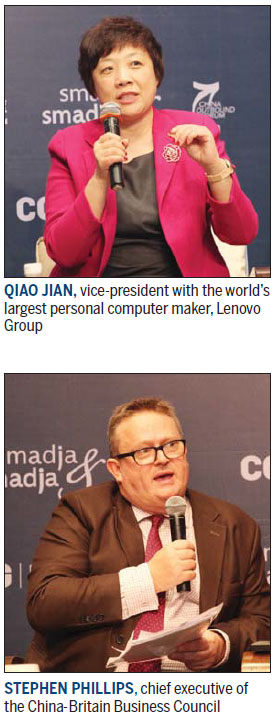Global presence doesn't make a multinational
Updated: 2016-01-22 08:37
By Chen Yingqun(China Daily Europe)
|
|||||||||||
|
Sun Yongfu (above), former head of the department of European affairs in the Ministry of Commerce. |
"Some Chinese banks have a very significant international presence as well, but they mostly serve the Chinese customer base, rather than serve the international customer base, so they are only part of the way to becoming truly global in my view."
Despite many state-owned enterprises that have an international presence and private sector companies that are beginning to internationalize quite rapidly, there are very few that are globally recognized.
"But it is changing really quickly, much more quickly than probably any other country," he says.
Phillips says the world will continue to see more and more Chinese companies internationalizing, and they need to do it for at least two reasons: one is to diversify markets and the other is, if they genuinely want to be leaders in that field, they need to be exposed to global competition, whether in services or products, and by going outside the home market and competing with the best of the world.
"If companies mange that in that process, both accessing new markets and moving up the value curve, then they are going to be very successful, but not all of them will succeed. It is not easy, it is very competitive."
Zhang Yang, a senior consultant with Spencer Stuart, a leading executive search and leadership consultancy, says that increasing overseas assets and income are only partial parameters of internationalization.
"If a company just invests in cheap resources overseas and then makes profit out of it, it is not truly internationalization, because they may not be a global company that adopts international standards and rules."
She says international companies have different strategies and targets for different markets, and operate globally. Their management systems, governance and diverse talent would be important measuring standards. But if Chinese companies are gauged by these aspects, most of them would get low grades.
She cites talent as an example. In many multinational companies, about 20 to 40 percent of the senior executive positions are held by talent sought globally, but in Chinese companies, the percentage is usually quite low: less than 10 percent.
Qiao Jian, vice-president of the world's largest personal computer maker, Lenovo Group, says that globalization is not just products or capital going global, but a global enterprise's culture and leadership are key, which is what she learned from Lenovo's failed experiences in the past.
She says that in the first four to five years after Lenovo acquired the personal computer business of IBM, its business met great setbacks.
"When we reflect on it, at that time, we paid a lot of attention to products and strategy, but ignored the culture and leadership components," she says. "Managing people from different countries is not merely relying on policies and regulations but more about winning recognition from local customers, executives and employees culturally, so that we do business holding the same values."
She says since 2008, Lenovo has made great efforts in global enterprise culture building, and its revenue is 15 times that of 10 years ago.
Today's Top News
Global push
AIIB chief vows to run clean, lean, green institution
'More Europe' to deal with 'triple crisis'
China gives beleaguered Tsipras a helping hand
China injects note of confidence in Davos
China and Gulf nations resume free trade talks
IMF starts to select new chief
Merkel insists on European solution for refugee crisis
Hot Topics
Lunar probe , China growth forecasts, Emission rules get tougher, China seen through 'colored lens', International board,
Editor's Picks

|

|

|

|

|

|








